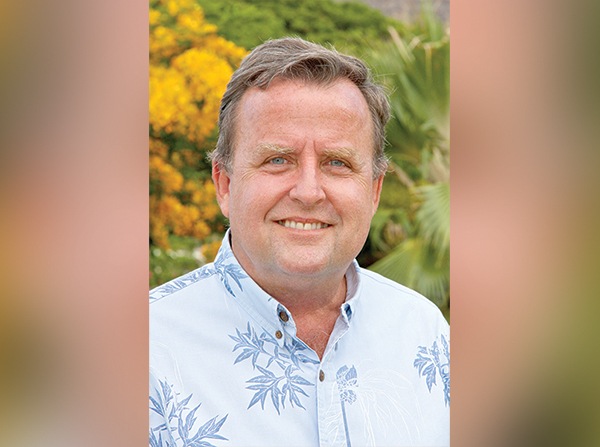LIHUE — Pesticide watchdogs are billing their recent trip to Syngenta’s hometown as a success. Kauai County Councilman Gary Hooser returned from Basel, Switzerland, where he addressed nearly 1,000 Syngenta stakeholders at the company’s shareholders meeting, asking the company to
LIHUE — Pesticide watchdogs are billing their recent trip to Syngenta’s hometown as a success.
Kauai County Councilman Gary Hooser returned from Basel, Switzerland, where he addressed nearly 1,000 Syngenta stakeholders at the company’s shareholders meeting, asking the company to drop its lawsuit against the County of Kauai.
But while the councilman realizes his request likely won’t be met by the chemical company, Hooser said the ability to share information with others about Kauai’s situation is what made the journey a success.
“Our main purpose was one of education and information, to tell our story in the home city of Syngenta, and we were greeted with open arms and really managed to get the word out,” Hooser said on Monday.
The Hawaii Alliance for Progressive Action supported the trip to Switzerland at the invitation from Swiss nonprofit “MultiWatch.” As the volunteer President of the Board for HAPA, Hooser, Malia Chun of Kekaha and Fern Rosenstiel made the trip.
Hooser said the trip raised the profile of their attempt to monitor restricted use pesticides on Kauai, which has ended up in a federal court and ruled in favor of Syngenta and three other companies that’s under appeal. He said that on Friday, MultiWatch is presenting the head of the Basel government and Syngenta executives with a petition signed by 6,000 people on Kauai island’s behalf.
On April 25, Hooser spoke to shareholders directly thanks to his host organization transferring a stock in his name to allow for a proxy appearance. His speech — portions of which were captured on video by Rosenstiel before she was removed from the meeting for not turning off the camera after being asked — asked that Syngenta stop its lawsuit. He also asked that the company treat Kauai the same as Switzerland in regards to pesticides such as atrazine that aren’t allowed in the European Union, but are on Kauai.
“We far exceeded our expectations,” Hooser said, adding they were interviewed on Swiss public radio, featured in reports in Basel, Bern and Zurich newspapers as well as television features. He said they were unaware recording wasn’t allowed in the private shareholders’ meeting.
“Nowhere was there any sign saying no pictures, no photography, he said, adding that any immediate impact back home from his request probably won’t be felt. “In the long term, it is possible but, again, the realist in me says probably there won’t be any changes in the near term.”
Syngenta spokesman Mark Phillipson said the company has been a good fit for Kauai.
Asked what the company thought of the Hooser’s visit to Switzerland and whether his request would change operations on the Garden Isle, Phillipson said Syngenta has and will continue to be a good neighbor.
“What we can say about our role on Kauai is that Syngenta has been part of the community on Kauai for more than 40 years providing jobs and other benefits to the rural economy since sugar cane and pineapple production declined,” he wrote in an email. “The island offers unrivalled climatic and agronomic conditions for crop research, which has benefited millions of growers around the world. We take very seriously our responsibility toward Kauai’s natural environment and the communities where we work.”
A measure co-introduced by Hooser and approved by the Kauai County Council in 2013 required commercial agricultural entities to disclose the pesticides applied and genetically modified organisms grown on their property. These requirements, outlined in Bill 2491, also required commercial agricultural entities to establish buffer zones around sensitive areas like nursing homes, schools and hospitals.
That law, challenged by Syngenta, DuPont Pioneer, BASF and Dow AgroSciences, was invalidated last year, when U.S. District Court Judge Barry Kurren determined that state laws pre-empted the need for a county law.
Two separate appeals — one by the County of Kauai and another by Ka Makani Hoopono, Center for Food Safety, Pesticide Action Network North America and the Surfrider Foundation — have been filed before the 9th Circuit Court of Appeals.
Phillipson said while a federal judge has already ruled in the company’s favor, Syngenta continues to address community concerns when it sprays, which is not a daily occurrence, by participating in the state’s Good Neighbor Program, which recommends a buffer of 100 feet from any occupied building.
“Syngenta is actually far more conservative by voluntarily taking land out of operation to insure a minimum distance of 1,700 feet between our fields and Waimea Canyon Middle School,” he wrote. “That distance is even greater for Kauai Veterans Memorial Hospital and neighboring residences.”
Hooser said people in Basel were surprised to learn of the legal battle around the law.
“People were flabbergasted,” he said. “They couldn’t understand.”
Atrazine is not allowed in the European Union, including Syngenta’s backyard, Switzerland. Phillipson said it wasn’t banned, but essentially not included on the allowed list because the registrants did not supply sufficient water monitoring data.
It can apply for the list so long as it provides the proper documents, the Australian Pesticide and Veterinary Medicines Authority states in its history on the pesticide. In the meantime, European growers use a similar pesticide to atrazine.
“Baloney,” Hooser called the argument, adding that 66,000 pounds were used in Hawaii last year. “They can talk in circle as much as they want.”
Hooser went individually and didn’t represent the Kauai County Council. The three visiting members pitched in to help fund the trip, as did MultiWatch and HAPA. He said the groups are looking forward to continue to share their message at other events at home and abroad.


